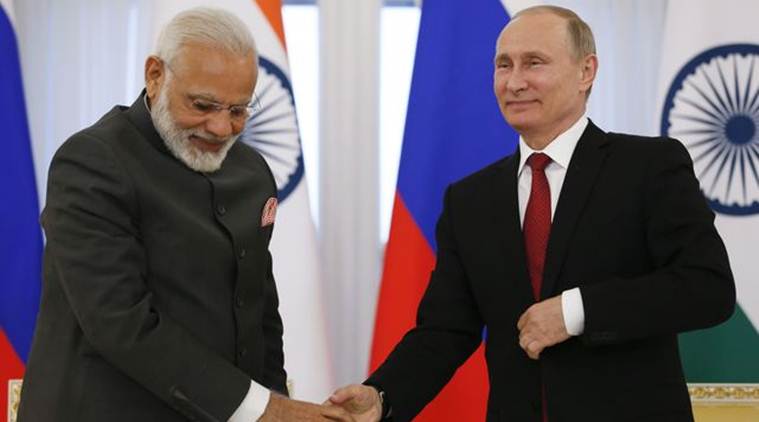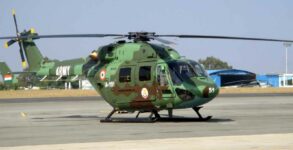Russian President Vladimir Putin is visiting India in the first week of October for the annual summit with Prime Minister Narendra Modi. The summit is very important for India as it will make clear what side of pole the country stands, especially in its defence relations with Moscow. Although, recent development in India that captured international attention too, indicated sufficiently that New Delhi will compromise nothing when it comes to its national interest. And go ahead signal given by the NDA government’s Cabinet Committee on Security over the purchase of five advanced S-400 triumf defence missile system from Russia just a few days ahead of Putin’s visit, showed it distinctly.
Despite the US threat to impose CAATSA (Countering America’s Adversaries Through Sanctions Act), New Delhi decided to give a go ahead signal on the purchase of the Russian defence system that India direly needs to strengthen its eastern and western frontiers. The deal on the S-400 triumf missile will be sealed during Putin’s October 4-5 visit, where the two countries will also witness signing of agreement on the purchase of four new Talwar-class frigates for the Indian Navy. It was during External Affairs Minister Sushma Swaraj’s recent visit to Russia, the frigate deal issue had come for the detail talks between the two countries. In the backdrop of India and the US holding their first two plus two dialogue and signing Communications Compatibility and Security Agreement (COMCASA) on September 6, New Delhi’s decision to go ahead with these Russian defense platforms has sent a clear message to the world that India will not put all eggs in one basket.
Besides defence, talks will be held on cooperation in the field of energy, science and technology, railway and infrastructure during Modi-Putin meet. As special privileged partners, India and Russia are jointly involved in several space and defence related projects; Brahmos missile is a shining example of scientific collaboration between the two countries. There is a likelihood of the two sides signing an agreement for sharing of expertise for ISRO’s ambitious human space mission project ‘Gaganyaan’ during Putin’s visit. In the course of EAM Sushma Swaraj’s recent visit to Moscow, the space cooperation issue had figured prominently during talks with Russian authorities. India plans to send its first man mission to space by 2022.
If media reports are to be believed, India and Russia are also engaged in talks to set up ground stations for the global positioning system of Russia, GlONASS and NaVIC, India’s indigenously developed GPS in the third country. The two sides are also like to launch talks for the creation of a corridor connecting Russia-Kazakhstan- Turkmenistan-Iran-Oman-India. To counter China’s Belt and Road Initiative in the Middle-East and Eurasian region, India has a plan to develop road, rail connectivity in the region. The International North South Transport Corridor (INSTC), which is basically a ship, road and rail connectivity project that links India with Moscow, is on the verge of operationalization. Infrastructure development works with this project are almost complete, now final touch is being given to complete formalities regarding customs and other paper works so that goods transported from India or any other stakeholders of the project don’t remain stuck in the midway. In this context, all stakeholders which include India, Iran, Azerbaijan, Armenia, Kazakhstan, Russia and others, are expected to hold a meeting in Tehran next month. This is another connectivity project that runs parallel to China’s One Belt One Road Initiative. All this speaks volume of India-Russia relations. Though owing to the presence of some anti-India bureaucrats in Kremlin, there have been ups and downs in the two countries’ relations, but the duo has largely worked hard to keep their engagement on an even keel.
India had a moment of paroxysm when Russia sold four Mi-35M attack helicopters to Pakistan. It continued with military drill with Pakistan in October 2016 even though the world was in great shock when Pakistan-based terrorists had attacked Indian Army’s base camp in Uri in Jammu and Kashmir in September 2016. Russia-Pakistan conducted second military drill in Minralney Vody in Russia in September 2017. India was hit below the belt when Russian Foreign Minister Sergei Lavrov gave a red carpet welcome to then Pakistan Foreign Minister Khawaja Asif during his visit to Russia on February 19, 2018.
The Russian Foreign Minister also stated that his country was ready to help Islamabad increase its anti-terror capabilities—a euphemism for providing arms to Islamabad. At a conference on international security in Moscow, Russian authorities did not stop Pakistan’s Minister for Defence Engineer Khurram Dastgir Khan from raising the Kashmir issue. Then this year on February 17, Baloch rebel leader Jumma Marri Baloch who has been residing in exile in Moscow for the past 18 years and running an anti-Pakistan campaign from there, changed his track at the behest of Russian intelligence officials and started blaming India for problems in Balochistan. India was humiliated and embarrassed when at the first six countries Speaker’s Conference in Islamabad in December 23-26, 2017, Russia endorsed Pakistani line on Kashmir.
The declaration signed by Speakers from Russia, Turkey, Iran, China, Afghanistan and Pakistan stated that “for ensuring global and regional peace and stability, the issue of Jammu and Kashmir needs peaceful resolution by Pakistan and India in accordance with UN Security Council resolutions.” But India treats all these as aberrations in its engagement with Russia. Since the Modi-Putin informal summit in Sochi in May, New Delhi wants to add strength to their strategic partnership. And it is likely to be seen during the Russian President’s forthcoming visit.


















